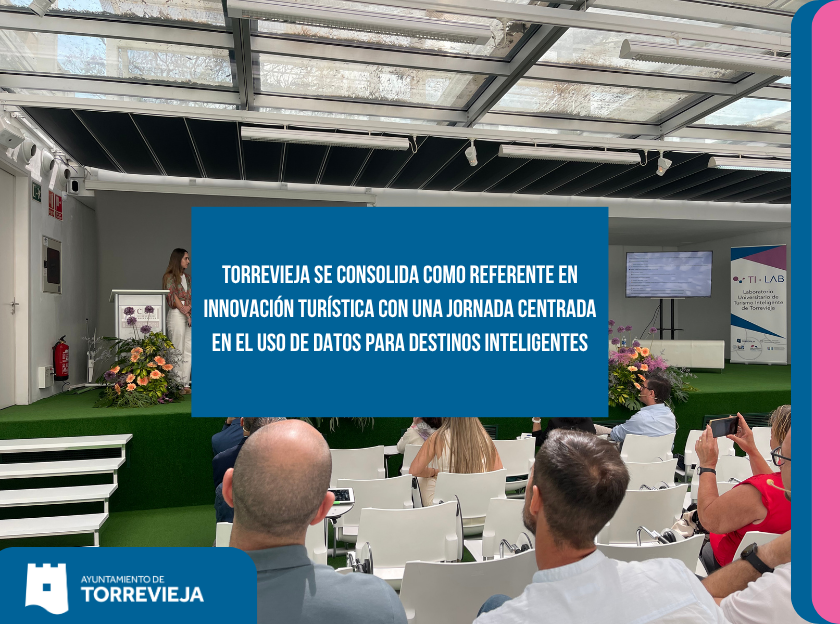Torrevieja consolidates its position as a benchmark in tourism innovation with a conference focused on the use of data for smart destinations.

Last Friday, the CDT+i Tourism Center in Torrevieja hosted a key event for the future of the tourism sector in the Valencian Community, focusing on data-driven innovation strategies for the management of Smart Tourism Destinations (STDs). The event brought together experts from academia, technology, and tourism management for a morning of conferences, debates, and innovative experiences.
The event, organized by Torrevieja City Council through its Torrevieja University Intelligent Tourism Laboratory (TI·LAB) in collaboration with the University of Alicante, was supported by organizations such as the University Institute of Tourism Research (IUIT), the University Institute of Computer Research (IUII), the Generalitat Valenciana (Generalitat Valenciana), and technology companies in the sector.
Following the official opening, the event featured a keynote address by María Velasco González, Director of Tourism R&D&I at SEGITTUR, an agency under the Secretariat of State for Tourism. In her speech, entitled "Collaborative governance as a driver of social innovation," Velasco emphasized the importance of participatory management models and the strategic use of data to transform tourist destinations toward more sustainable, digital, and people-centered scenarios through proper destination governance.
The project “Tourist Data Tasting” was then presented, A pioneering initiative driven by TI·LAB that allows students from the Master's in Data Science at the University of Alicante to apply analytical knowledge to real-life tourism problems. The projects, which focused on data from platforms such as Airbnb and Vrbo in several municipalities in the Vega Baja region, were recognized for their innovative approach, technical rigor, and usefulness for decision-making in tourist destinations. The first award-winning group at the 2025 Tourism Data Tasting was composed of Claudia Carratalá Lillo, Eric García Forner, Daniel McEvoy Oliver, Víctor Noblejas Carreto, and Miguel Alejandro Plana Torregrosa. Their proposal, entitled "Application proposal focused on housing rentals through data analysis and artificial intelligence," represents a comprehensive approach to the short-stay tourist rental phenomenon, applying data mining and machine learning techniques to a set of real data extracted from platforms such as Airbnb and Vrbo.
Second place in this edition went to the Mitosis Inversa group , made up of Eric Ayllón Palazón, Vicent Baeza Esteve, Paula García-Tapia Mateo, Noelia Luna Barahona, Alejandro López García and José Melgarejo Hernández , students of the Master's Degree in Data Science at the University of Alicante, within the Data Mining subject corresponding to the 2024/2025 academic year. Their proposal, entitled “Tourism with Conscience: Data that Breathe [An environmental analysis applied to Torrevieja]” , constitutes a contribution of great academic and strategic value by integrating environmental variables into the analysis of tourism data.
The initiative is part of the Data Mining course , taught in the 2024/25 academic year, whose teaching approach includes the design and execution of a comprehensive data analysis project in an applied domain. In this case, the students selected a current and complex problem related to residential tourism and the dynamics of the temporary accommodation market in different locations in the southern province of Alicante.
One of the highlights was the roundtable discussion "From Concept to Action: Data-Driven Strategies for Tourism Intelligence," moderated by Marco A. Celdrán Bernabéu, technical coordinator of TI·LAB. The panel brought together representatives from technology companies and consulting firms with proven experience implementing tourism intelligence solutions, who, from their respective fields, offered a critical, operational, and forward-looking perspective on the use of data in destination planning and governance. José María Cecilia Canales, from SensingTools, focused his presentation on the deployment of sensor systems applied to the analysis of tourist flows, highlighting the gap between technological availability and the capacity for institutional integration of the information generated. Mariano Torres, CEO of SienConsulting, introduced a reflection on data governance, emphasizing the need to build public-private collaboration frameworks that transcend rhetoric and materialize in systematic processes of co-design, interpretation, and action.
For his part, Antonio Sánchez Zaplana, representative of AnySolution, highlighted the importance of having operational collaboration frameworks capable of responding to the volatility and complexity inherent in the contemporary tourism phenomenon. Throughout the debate, key issues were addressed, such as the instrumentalization of data in decision-making, the building of institutional capacities for its management, the risks of hyper-fragmentation of sources and solutions, and the need to move toward a true data culture that permeates public tourism policies across the board. The panel demonstrated that the challenge no longer lies solely in generating more data, but in translating it into actionable, legitimate, and shared knowledge, enabling destinations not only to be more efficient, but also more fair, resilient, and sustainable. According to the ideas gleaned from this panel, data spaces are, in the short term, one of the strategies with the greatest potential for leveraging data, thanks to the promotion of governance and public-private collaboration.
The event was closed by the Deputy Mayor of Torrevieja and Councilor for Tourism, Rosario Martínez Chazarra , who highlighted the importance of continuing to support the Torrevieja University Laboratory for Intelligent Tourism (TI·LAB) and these spaces for joint reflection, where applied knowledge, technological innovation, and institutional commitment align with a vision for the future of the city. The event served to consolidate Torrevieja as a living laboratory for tourism innovation, where the intelligent use of data aligns with the Sustainable Development Goals and a more integrated and resilient vision of the territory.